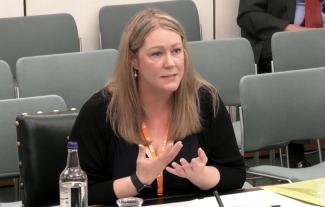Parliament not a safe space if you stammer, committee told

People who stammer in the House of Commons are often mocked and jeered, a parliamentary committee looking to improve accessibility was told this week.
On Tuesday, former STAMMA trustee Gill Rudd gave evidence to the Modernisation Committee on how parliament can be a hostile place for people who stammer.
The Modernisation Committee, a group looking at ways to improve access to the House of Commons and its procedures, invited Gill, a speech & language therapist, and others to describe the problems politicians who stammer can face during debates.
Listening to Gill give evidence was a panel of politicians headed up by Lucy Powell MP, Leader of the House of Commons.
Representing the Inclusive Parliament coalition, Gill told them: "There have been some specific examples where people with a communication difference or disability have been mocked or accused of being drunk or asked to speed up”.
She added: "Then there are more general examples... just last year we had senior politicians — somebody stumbling over their words — and then people mocking them and then that becoming a news feature."
Not a safe space
Gill went on to highlight the impact this hostility can have on wider society, saying: "What does that say to people with communication differences and disabilities about whether this is a space for them? If MPs mock people, mock speakers, mock other MPs when they trip over their words, how on earth can you feel comfortable going and talking to them and sharing your views?"
To conclude, Gill told the panel: "I'd really love to see a conversation about how you all treat each other. Because I see really collegial, positive conversations and spaces like this but that's not always represented in what we see in wider forums, and I think that's really important."
In response, committee member Sarah Coombes MP agreed, saying: "I think the way we behave in the chamber, what the public see on TV really does matter a lot, and has implications much wider than just that room."
This hearing, which took place at the Palace of Westminster, was the second stage in a process set up by the Modernisation Committee. Established last year to identify procedures at the House of Commons that are preventing accessibility, the committee invited organisations and members of the public to submit their arguments.
In response, the Inclusive Parliament coalition, made up of STAMMA, the Royal College of Speech & Language Therapists and over 30 other organisations, was formed to make the case for people with speech communication differences. It submitted written evidence, highlighting the case of Chris Nelson, who withdrew his candidacy to become an MP after being mocked by colleagues.
We will keep you posted on what happens next.
In the meantime, you can watch Gill and others giving evidence on the parliamentlive.tv website. The link takes you to the passage mentioned above.
































